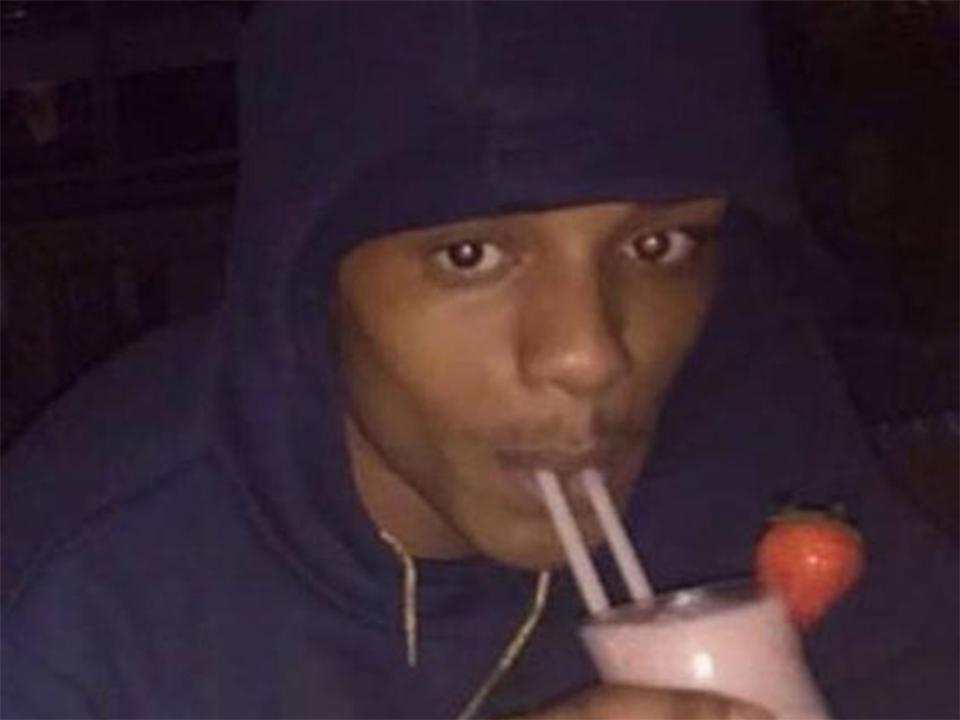Rashan Charles's family ‘devastated’ by decision not to prosecute Met Police officer

The family of a young black man who died while in police restraint has said they are "devastated" after the Crown Prosecution Service (CPS) announced the police officer who restrained him would not face charges.
Rashan Charles died in the early hours of 22 July after being chased into a shop in the east London district of Dalston, where CCTV showed an officer from London's Metropolitan Police struggling with him on the floor.
A common assault charge against the officer was considered by the CPS, but in a statement it said the “evidential test” had not been met.
Mr Charles’ great-uncle, John Noblemunn, told The Independent he felt the decision was “perverse” and “another attack on young black boys”.
The family was “devastated” by it, he said.
"It doesn’t bode well for Rashan receiving any justice for the loss of his life," he said, adding that his grandmother and father were "really upset about it."
He said: "We still want everyone to keep the peace in this, but we still request justice for Rashan. The criminal justice system has to stand up and be counted.
He added that they did not "understand how if someone is thrown to the floor in a violent manner, how that isn’t common assault."
He said: "This gives the green light for any officer to attack any black youth, especially in London. We’re saying this cannot be allowed to continue. Rashan wasn’t resisting, so why the violence? Anyone can see that from the CCTV; he wasn’t struggling.
“This is just another attack on young black boys, and in that an attack on the black community in general from the police and the criminal justice system.”
The Independent Office for Police Conduct (IOPC) said that, due to findings of an ongoing investigation into the death, the Metropolitan Police Service has suspended searching mouths by force due to the associated risks.
A review of their guidance will be conducted after the investigation identified "conflicting" available advice given to police nationally about searching people suspected of placing drugs or other packages in their mouths.
The pathologist investigating the case said Mr Charles' death was most likely caused by him attempting to swallow a plastic package, which subsequent forensic testing showed contained a mixture of caffeine and paracetamol.
They identified no other significant injuries to the head, neck or torso of Mr Charles that would suggest prolonged or excessive restraint in the lead up to his death.
A CPS spokeswoman said: “Following the death of Rashan Charles in July 2017, the IOPC referred a file of evidence in relation to one Metropolitan police officer for a possible charge of common assault. The CPS has considered the matter and decided the evidential test for a prosecution for common assault is not met. We will therefore not be taking any further action regarding this offence.”
The officer who apprehended Charles is nonetheless still under investigation by the IPCC for gross misconduct for the restraint and his handling of the subsequent medical emergency, which could potentially result in his dismissal from the Met.
It comes two months after a judge ruled that the officer and a second man who later intervened would remain anonymous throughout the inquest into the 20-year-old's death, following claims by officers that they were at risk of reprise attacks if their names were made public.
In an official statement, the family of Mr Charles reiterated Mr Noblemunn's comments, saying they did “not understand” the decision not to charge the officer who restrained him. They also urged that the suspension of mouth searches “should not detract” from the question of whether the officer acted lawfully.
“The family do not understand the CPS's decision not to prosecute this officer for even a low level common assault. The CCTV shows a police officer taking very forcible hold of Rashan from behind, putting him to the ground and handcuffing him,” they said
"To us, this seems to show an unnecessary use of force. For there to be public confidence in policing we call for due process in the form of a criminal trial.
“We are aware that the IOPC has also raised concerns about police training on mouth searches, but this should not detract from the question of whether this officer acted lawfully, and if not, whether this played a part in Rashan's untimely death.”
Deborah Coles, director of Inquest, a charity that has been supporting the family, said: “The routine lack of criminal action following police deaths is the single greatest source of anger and pain for families who expect and demand a system capable of delivering justice and accountability.
“The family of Rashan Charles have every reason to feel bitterly let down at a decision which many will find difficult to reconcile with the CCTV evidence widely seen. The processes that now follow must provide this family with answers as to how the actions which ended with Rashan’s death were lawful and justified.
"Continuing serious concerns about the disproportionate number of young black men who are dying following police restraint must be addressed.”
The family’s solicitor, Carolynn Gallwey of Bhatt Murphy, said: “The family’s focus remains on establishing why it has been decided that this officer’s use of force was justified and proportionate, and on fully exploring whether this played a role in Rashan’s death.”

 Yahoo News
Yahoo News 